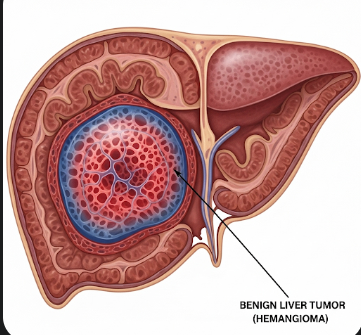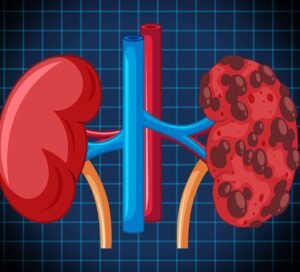Overview
Benign liver tumors are noncancerous growths in the liver that generally do not spread to other parts of the body. They are often discovered incidentally during imaging tests performed for unrelated reasons. While most benign liver tumors cause no symptoms and require no treatment, certain types may lead to discomfort, complications, or confusion with malignant tumors. In Korea, patients benefit from advanced imaging, precise diagnostics, and minimally invasive treatment options when intervention is needed.
What is a Benign Liver Tumor?
A benign liver tumor is an abnormal mass of liver cells that is not cancerous and does not invade nearby tissues or metastasize. The most common types include:
- Hepatic hemangioma – A mass of blood vessels, often small and harmless.
- Focal nodular hyperplasia (FNH) – A growth caused by a localized overreaction of liver cells to blood flow changes.
- Hepatic adenoma – A benign tumor linked to hormone use or metabolic disorders; carries a small risk of bleeding or turning cancerous.
Symptoms
Most benign liver tumors cause no symptoms. When symptoms do occur, they may include:
- Upper right abdominal discomfort or fullness
- Nausea or bloating
- Feeling of pressure after eating
- Rarely, sudden abdominal pain due to tumor bleeding
Causes
The exact causes depend on the tumor type but may involve:
- Hormonal factors – Oral contraceptive or hormone therapy use (especially for hepatic adenomas)
- Vascular malformations – For hemangiomas
- Metabolic and genetic conditions – Such as glycogen storage diseases
- Blood flow irregularities in the liver
Risk Factors
Risk factors vary depending on tumor type and include:
- Female gender (especially for hepatic adenomas and FNH)
- Long-term oral contraceptive use
- Pregnancy (due to hormonal changes)
- Certain genetic conditions
- Metabolic disorders such as diabetes or obesity
Complications
While benign liver tumors are usually harmless, possible complications include:
- Bleeding within the tumor (especially in hepatic adenomas)
- Tumor rupture, causing internal bleeding
- Misdiagnosis as a malignant tumor, leading to unnecessary surgery
- Very rare malignant transformation in hepatic adenomas
Prevention
There is no guaranteed way to prevent benign liver tumors, but risk may be reduced by:
- Limiting long-term use of high-dose estrogen medications unless medically necessary
- Maintaining a healthy weight and lifestyle
- Managing underlying metabolic or hormonal disorders
Treatment Options in Korea
Diagnosis
Korean hospitals use highly advanced imaging and diagnostic tools to accurately differentiate benign liver tumors from cancerous growths:
- Ultrasound – Often the first step in detecting a liver mass
- CT scan and MRI – Provide detailed imaging to identify tumor type and features
- Contrast-enhanced ultrasound (CEUS) – Improves accuracy in characterizing lesions
- Blood tests – To assess liver function and rule out cancer markers
Medical Management
- Observation – Most benign liver tumors are simply monitored with periodic imaging.
- Lifestyle adjustments – Stopping oral contraceptives or hormone therapy if linked to tumor growth.
- Symptom management – Pain control and dietary recommendations for those with discomfort.
Surgical or Advanced Therapies
In Korea, surgery is only considered when tumors are large, symptomatic, or have uncertain diagnosis:
- Liver resection – Removal of part of the liver containing the tumor.
- Laparoscopic surgery – Minimally invasive option for smaller tumors.
- Embolization therapy – Cutting off blood supply to the tumor to shrink it, mainly for hemangiomas at risk of bleeding.
Rehabilitation and Support
- Regular follow-ups to ensure tumor stability.
- Nutrition counseling for liver health.
- Psychological support for patients worried about tumor growth or misdiagnosis.
Prognosis
The outlook for benign liver tumors is excellent in most cases. With Korea’s advanced imaging and surgical techniques, patients receive precise diagnosis and targeted treatment only when necessary, minimizing risks and recovery time. Most people live normal, healthy lives without complications once the tumor is confirmed as benign.













